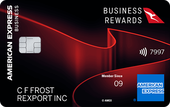
The lowdown.
What is a black credit card?
While "black" refers to the card's colour, it primarily signifies the card's elite status compared to gold and platinum cards. Black cards come with premium complimentary benefits, often featuring higher and less restricted loyalty points earning rates, and inevitably command higher annual fees. Both personal and business users can access black level credit cards.
Some issuers may opt for alternative names like Premium, Diamond, Prestige, Premier, or the more recent Signature rather than using the term "black" in the card's name. However, the card's distinctive black appearance always indicates its status and potential benefits. Certain black credit cards are even crafted from metal.
Possessing a black card allows you to make a statement about your financial standing while enjoying enhanced rewards points, earning rates, and superior complimentary perks.

What are the benefits of a black credit card?
While benefits can vary significantly between black credit cards, most offer the following advantages:
- Higher credit limits
- Complimentary travel insurance coverage
- Generous sign-up bonus offers
- Increased rewards points earning rate per dollar spent
- No points cap or a substantial cap
- Complimentary shopper's insurance (extended warranty, purchase protection, price guarantee)
- Dedicated personal concierge service
High end black card benefits
Black credit cards with the highest annual fees often include the above and these additional perks:
- Airport lounge access, sometimes with full membership or through passes
- Complimentary annual domestic return flight
- Complimentary airport transfers
- Annual travel credit voucher
- Enhanced insurance coverage
- Luxury hotel group membership, complimentary nights, and room upgrades
- Access to exclusive shopping, golf, and other experiences
- Invitation-only events
- Priority service for account queries, travel, and concierge assistance
If you're considering switching to a black credit card, it's wise to take full advantage of the opportunity. Transitioning to a new bank or issuer for your black card could offer two significant benefits:
- Earning a substantial sign-up bonus – potentially up to 100,000 points, depending on the available offers;
- You can transfer your existing card balance to the new card and enjoy an extended interest-free period on that balance, possibly up to 20 months.
In reality, black cards are more likely to offer bonus points than balance transfer promotions. However, it's also worth keeping an eye out for introductory low or 0% purchase interest rates or reduced annual fees for the first year, as these offers are occasionally available.

Which providers offer black credit cards in Australia?
According to Credit Card Compare's database, 13 card issuers in Australia offer black credit cards, including ANZ, American Express, Citi, CommBank, NAB, Virgin Money and Westpac.
However, as a black credit card can simply refer to a provider's highest-status level card, some institutions, including the Big Four Banks, may list them under alternative names.

How much do black credit cards cost?
Expect to pay a significantly higher annual fee for a black credit card compared to other card types, with the current median fee falling between $300 and $400 per year.
Although the annual fee for a black card is substantial, savvy cardholders can easily derive benefits that far exceed the fee's value. Even without being a big spender, you can recoup the annual fee through rewards points alone, as long as you channel most of your spending through the card instead of using cash or other payment methods. Frequent flyers will also appreciate the value of complimentary benefits like travel insurance, other insurance policies, and airport lounge passes, which can collectively be worth around $1,500 annually.
Don't expect to get a low interest rate with your black credit card. The interest charged on overdue purchase balances is likely to be at least 20% per annum, with even higher rates for cash advances.

What to consider when comparing black credit cards
These cards are loaded with benefits, making the comparison process a task in itself. Here are the key aspects to examine:
- Sign-up bonus. Most black credit cards offer new customers a substantial welcome bonus, often exceeding 100,000 points. However, it's crucial to review the terms and conditions of the offer, as they vary between cards. Banks typically require a certain amount of money to be spent on the card within 90 days of activation. Also, consider that some cards award bonus points on the account opening anniversary, which can be advantageous in the long run.
- Earn rate. As expected, black credit cards boast higher earn rates. While an extra 0.5 points per $1 spent may seem insignificant, it can considerably impact your rewards account over time. Check for any restrictions on the number of points you can earn. Black credit cards usually have the most liberal and least restrictive policies on caps and tiers, but it's worth examining the details, especially if you're a high spender.
- Rewards program. If you're already committed to a specific rewards program, the decision is straightforward. If not, consider factors such as your most frequent travel destinations, preferred domestic and international airlines, and favoured lounge network. If you value flexibility above all else, consider a credit card that allows you to transfer earned points to other programs, such as Membership Rewards, CommBank Awards, NAB Rewards, ANZ Rewards, Altitude Rewards, or Amplify Rewards.
- Annual fee. Given that keeping your account open will cost hundreds of dollars annually, ensure that the higher points earn rate, welcome bonus, and lifestyle benefits are worth it for your specific needs and preferences.

Expert opinion
Who black credit cards are most suitable to

David Boyd, co-founder of Credit Card Compare, explains his opinion of a black credit card.
It only makes sense to choose a black credit card if you intend to use it for every possible expense and then pay off the balance in full each month. The interest rate should only be a concern if you encounter a temporary liquidity issue or accidentally miss a payment due date. The bottom line is that card issuers don't market their black cards to individuals seeking low interest rates.

How do I get approved for a black credit card?
Black credit cards are designed for higher income earners who are relatively big spenders and make most of their purchases using a credit card.
To be eligible for a black credit card, you'll typically need an above-average income and a very good to excellent credit score.
- Credit score. Your credit score is crucial when applying for a black credit card. A good or excellent credit score is necessary, which implies no missed payments or recent negative credit history. Review your credit report before applying to ensure it meets the requirements.
- Income requirements. The minimum income required varies between banks and specific cards, but expect it to be in the range of $65,000 to $70,000 per year, with some requiring even more. If you cannot provide proof of your income, it's best not to apply.
- Target market. Banks aim their black credit card offers at applicants who travel frequently for business or leisure. These individuals can earn extra rewards points and take advantage of additional complimentary benefits, allowing them to recoup far more than the value of the high annual fee.

Expert opinion
Find a black credit card that actually has benefits you'll use

Andrew Boyd, co-founder of Credit Card Compare, explains,
It's still important to compare your options to see what fees and interest rates are charged across the available black credit cards. This way, you can find one that suits your needs and budget. Despite the higher costs, black credit cards often come with premium features and benefits that may outweigh the expenses for some users.

Is a black credit card worth it?
If you're unsure whether a black credit card is worth the cost, there are several factors to consider when evaluating your options.
- Can you meet the spending requirement for the sign-up bonus? Will you need to make unnecessary purchases just to earn the bonus points?
- Will you pay off the balance each month? If you're unable to clear the balance, interest charges can quickly outweigh the value of the rewards and benefits provided.
- Will you be able to use the card frequently? Can you channel enough spending through the card to earn sufficient points to justify the annual fee? Keep in mind that some merchants do not accept American Express.
- Will you use the features offered? Black credit cards often include several complimentary insurances, airport lounge access, priority boarding, status, etc. Consider whether you'll use all of these benefits or if you can manage with fewer perks.
- Can you consolidate other products you already have? For instance, does a black card combine the features of multiple cards, allowing you to simplify your finances and reduce waste? Can you replace existing paid memberships and subscriptions with your new card?






